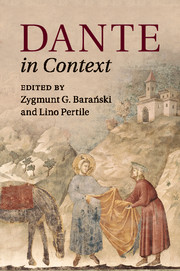Book contents
- Frontmatter
- Dedication
- Contents
- List of illustrations
- List of maps
- Notes on contributors
- Chronology
- Abbreviations and note on translations
- Introduction
- Part I Politics and society
- 1 Empire, Italy, and Florence
- 2 Economy
- 3 Law
- 4 Justice
- 5 Men and women
- 6 Church and orthodoxy
- 7 Heresy and dissidence
- 8 Daily life
- Part II Intellectual traditions
- Part III Linguistic and literary cultures
- Part IV Visual and performative culture
- Part V Dante: life, works, and reception
- Further reading
- Index
8 - Daily life
from Part I - Politics and society
Published online by Cambridge University Press: 05 October 2015
- Frontmatter
- Dedication
- Contents
- List of illustrations
- List of maps
- Notes on contributors
- Chronology
- Abbreviations and note on translations
- Introduction
- Part I Politics and society
- 1 Empire, Italy, and Florence
- 2 Economy
- 3 Law
- 4 Justice
- 5 Men and women
- 6 Church and orthodoxy
- 7 Heresy and dissidence
- 8 Daily life
- Part II Intellectual traditions
- Part III Linguistic and literary cultures
- Part IV Visual and performative culture
- Part V Dante: life, works, and reception
- Further reading
- Index
Summary
Dante's lifetime spanned an era of great change in most aspects of daily life in Florence and northern Italy, where he spent his nineteen-year exile. There is a vast secondary literature on daily life, especially food, housing, dress, work, health, and pastimes. Each topic could be a book in itself and many already are. However, the more detailed scholarship treats the period after Dante's death, the era that began with the financial crises and the first visitation of the Black Death in the 1340s. This reflects not just scholarly interest but also the huge growth in literary and archival sources for the history of Florence. Sources for Florentine history and daily life do survive from the 1280s on, especially records for political and civic institutional history, along with the famed chronicles of Dino Compagni (c.1255–1324) and Giovanni Villani (c.1276–1348). This era also saw the great growth and increased survival of notarial material in the form of individual parchments and cartularies. These documents also become more detailed and sophisticated in terms of the information they provide on daily life. The late thirteenth century is also the era of the development of account books and records for business and building activities, both for lay or communal and clerical organizations. These become a flood of documentation for material life and culture after Dante's death. The politics of the period 1280 to 1302, the decades leading up to Dante's exile, have been well studied. As we shall see, there are adequate, if not good summaries on the details and practices of everyday life until 1321, but much more could be done using archival sources. The period after 1340 also has the benefit of the distinctive Florentine production of memoir and account books by various merchants and heads of families. All of these later sources contain much information on food, housing, dress, health, work, and pastimes, and have been more mined by scholars of the fourteenth and fifteenth centuries. There do survive the stories of writers such as Giovanni Boccaccio (1313–75), Franco Sacchetti (c.1330–1400), Giovanni Sercambi (1348–1424), and Gentile Sermini (fl. 1424) among others who relate stories involving everyday life around 1300, including some that refer to Dante. But whether these are true representations of the earlier period is another issue. There can be little doubt that the study of material life from the earlier era does offer opportunities for research and study.
- Type
- Chapter
- Information
- Dante in Context , pp. 119 - 134Publisher: Cambridge University PressPrint publication year: 2015

